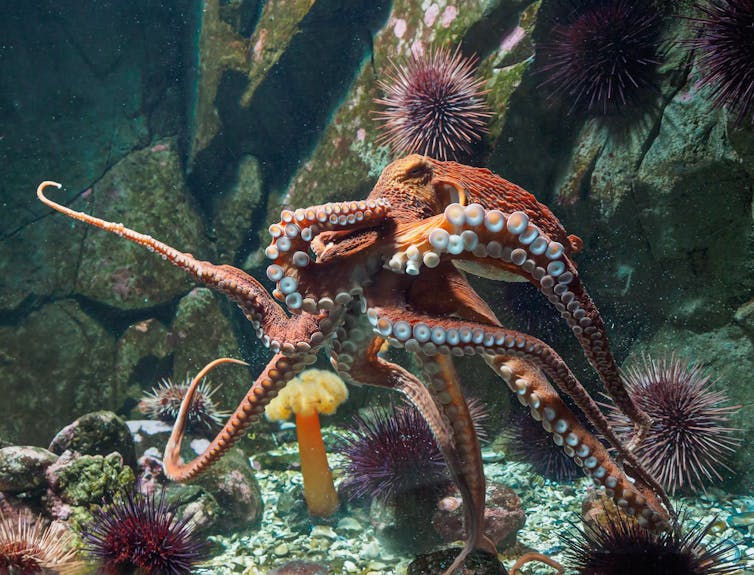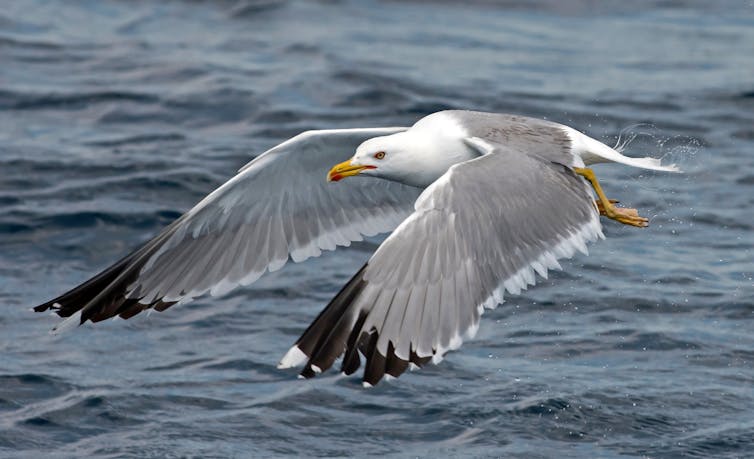Source: The Conversation (Au and NZ) – By Zoe Doubleday, ARC Future Fellow and marine biologist, University of South Australia
This article is part of the “Who would win?” series, where wildlife experts dream up hypothetical battles between predators (all in the name of science).
If you’re anything like us, you may have wondered if an octopus and a seabird would ever end up in a fight. Well they do, and it’s a YouTube wormhole that can prove quite addictive.
I mean, how do these elusive aliens of the sea — more closely related to snails than fish, birds or humans — bring down our familiar feathered friends? Let’s take a closer look.
Why would they end up in tussle?
Contrary to popular belief, octopus don’t actually seek out birds to kill them, but there are some that may be in a bad mood and the bird is in the wrong place at the wrong time.
All octopus are carnivores and like to eat things such as shellfish, crabs and fish (and, yes, even each other), but never birds. The vast majority of the time, a fight between an octopus and a bird may break out because the bird is trying to get some dinner and the octopus and is just trying to live for another day.We know seabirds eat octopus, but they aren’t a huge part of their diet — more like a snack.
Ocean-going seabirds such as shags, petrels, penguins and albatross eat octopus more often than birds such as seagulls. But in general, seabirds prefer fish or other cephalopods like squid.
Octopus are just too tricky to eat. Most live on the seafloor, rather than float in the water. They have no bones, just a tiny vestigial shell, which enables them to hide in the tiniest crevices and cracks (unlike squid which have a backbone-like structure called a pen).
Even though octopuses are good at hiding and camouflaging, sometimes the seabirds find them and then things get interesting.
Meet the opponents

Let’s get ready to rumble! In the red corner we have the octopus with eight muscular, hyper-flexible arms. But these aren’t any normal arms, they’re each equipped with their own “brains” and hundreds of grasping suckers that can independently sense light and taste by touch.
Read more: Curious Kids: could octopuses evolve until they take over the world and travel to space?

In the blue corner we have the bird with killer vision and two sharp claws that can catch prey with incredible speed and precision. You may be noting that the bird has a sharp beak to add to its armoury — but so does the octopus.
You wouldn’t want to be bitten by the octopus, though, because it has venom. The venom probably wouldn’t be enough to kill you (unless it’s a blue ringed octopus) but man, that would hurt. One big detail is that octopus can only breath underwater and cannot leap into the air — gravity makes life hard when you have no bones.
While it’s true seabirds can only breathe air, they are masters of both land and sea. Penguins are fast and agile swimmers, and wing-propelled diving birds can plunge deep beneath the surface of the water (five metres in the case of albatrosses and 10-20m in the case of petrels). They can also hold their breath for minutes at a time. But not forever.
How might a fight play out?
The bird sees the octopus from the surface and thinks it can snag it for a snack. It dives down and, as soon as it hits the water, the octopus comes out swinging, arms whipping and pulling the bird closer with every recoil.
Hundreds of suckers grasp and hold with dexterity and strength (did you know one sucker of a giant Pacific octopus can hold up to 16 kilograms? And there’s 250 of them per arm!).

The bird is pecking and clawing at the arms, but there’s too many of them. And if an octopus loses an arm or two in a battle, they don’t mind too much, they can always regenerate them.
The bird is trying to fly or swim away and the octopus is trying to keep it under…
So, who would win?
Depending of the size of both animals the fight could go either way. A bird could encounter anything from the giant Pacific octopus (weighing in at over 100 kg) to the featherweight pygmy octopus (weighing in at less than one gram).

If the octopus is small, then the bird gets a quick and easy snack. But when the octopus is larger or the same size of the bird, that’s when fights ensue (often on YouTube).
The remains of small octopus are not uncommon in the stomach of seabirds, but larger octopus remains have also been found.
At the smaller end, paper nautilus (an unusual type of octopus with an external shell) have been found in the stomachs of little penguins. At the larger end, the Maori octopus — which grows up to a hefty 12 kg and claims the weight record for the Southern Hemisphere — has been found in the stomachs of the southern royal albatross.
So at the end of the day, the outcome depends on the size, stamina and species of both animals.
A lot of the time, the bird wins as it is designed to dive and hunt marine animals, but as YouTube shows, sometimes the octopus gets away with it.
Read more: I’ve always wondered: who would win in a fight between the Black Mamba and the Inland Taipan?
– ref. Who would win in a fight between an octopus and a seabird? Two marine biologists place their bets – https://theconversation.com/who-would-win-in-a-fight-between-an-octopus-and-a-seabird-two-marine-biologists-place-their-bets-158520




